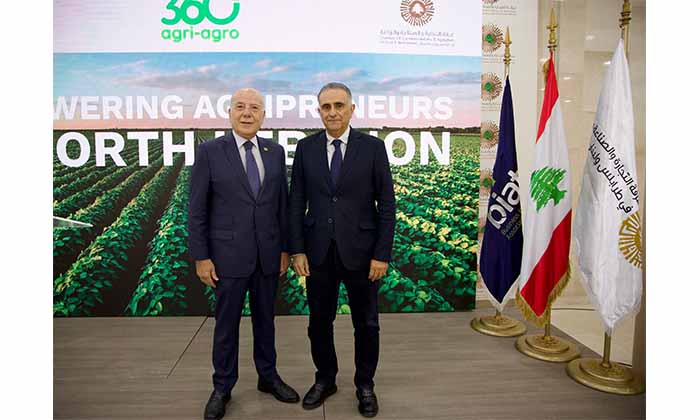The Chamber of Commerce, Industry, and Agriculture of Tripoli and the North (CCIAT), in collaboration with Business Incubation Association in Tripoli (BIAT), has launched the Agri-Agro 360 Project, designed to support small and medium enterprises, startups, farmers, cooperatives, entrepreneurs, youth, and innovators in the field of agricultural technology.
This ambitious initiative responds to the growing challenges facing the agriculture and agri-food sectors in a rapidly evolving world. It serves as a bridge between agricultural traditions and modern innovation, empowering agricultural entrepreneurs to grow and sustain their projects.
The project aims to provide tailored technical and administrative support to agricultural and agri-food initiatives, enhance resilience and growth potential, and contribute to the development of the agricultural sector in Akkar and Northern Lebanon—ultimately making a positive impact on the Lebanese economy.
The launch event was held in the grand hall of the Tripoli Chamber, in the presence of parliamentary, ministerial, diplomatic, economic, and union figures, as well as mayors, businesspeople, and a large crowd of interested attendees.
The ceremony opened with the Lebanese national anthem, followed by welcoming remarks from media host Joe Farchakh. Chamber President Toufic Dabboussi then delivered a speech, stating: “It brings me great joy to join you today to launch the Agri-Agro 360 Program, a pioneering project that reflects our shared commitment—as the Chamber of Tripoli and the North—to Lebanon and to agriculture as a vital driver of economic growth and sustainable development.
He added: “This program is more than a collaboration between two institutions—it is a synergy of vision and capabilities, of ambition and execution. Agri-Agro 360 is a fully integrated platform for nurturing innovative agricultural ideas and providing farmers, innovators, and entrepreneurs with comprehensive support—from training and development to marketing and export. We believe that the Lebanese agricultural sector needs only trust, support, and smart investment to thrive. Today, we take a concrete step toward that vision, hoping this program will be a true turning point that restores agriculture’s standing and reinforces the farmer’s role in building a productive and self-reliant economy.”
He concluded: “I thank the dedicated teams at the Tripoli Chamber and BIAT, and everyone who helped bring this project to life. Together, we plant the seeds of the future—and together, we reap hope and progress.”
Nasri Mouawad, Chairman of BIAT, also spoke, emphasizing the project’s significance: “As of 2023, agriculture contributes only 1.09% to Lebanon’s GDP—down from 12% in 1995. These numbers alone highlight the immense work that lies ahead. We believe in local talent and in supporting the economies of remote regions—this is exactly the role this program aims to fulfill.”
Following the speeches, the Chamber’s Director General Ms. Linda Sultan presented a detailed overview of the project, including its benefits and how to register for its various programs and services.
After a short break, a panel discussion titled The Agricultural and Agri-Food Sectors: Challenges, Strengths, and Weaknesses was held, moderated by Joe Farchakh. Panelists included food industry expert Dr. Bachar Berrou, Ms. Nadine Khoury representing Quinta Group, Dr. Roberta Ballaa from the Agriculture Department at the University of Balamand, and Dr. Khaled Al-Omari, Director of the Quality Control Laboratories at the Tripoli Chamber.
The second session, titled Success Stories and New Scientific Agricultural Approaches, featured several distinguished speakers: Dr. Antoine Daccache, founder of Agrinnovation; Engineer Charbel Abou Jaoudeh, a leading figure in olive oil production; Ms. Sarah Harb, entrepreneur and founder of Bionord; and Dr. Charbel Tawk, agricultural engineer.
